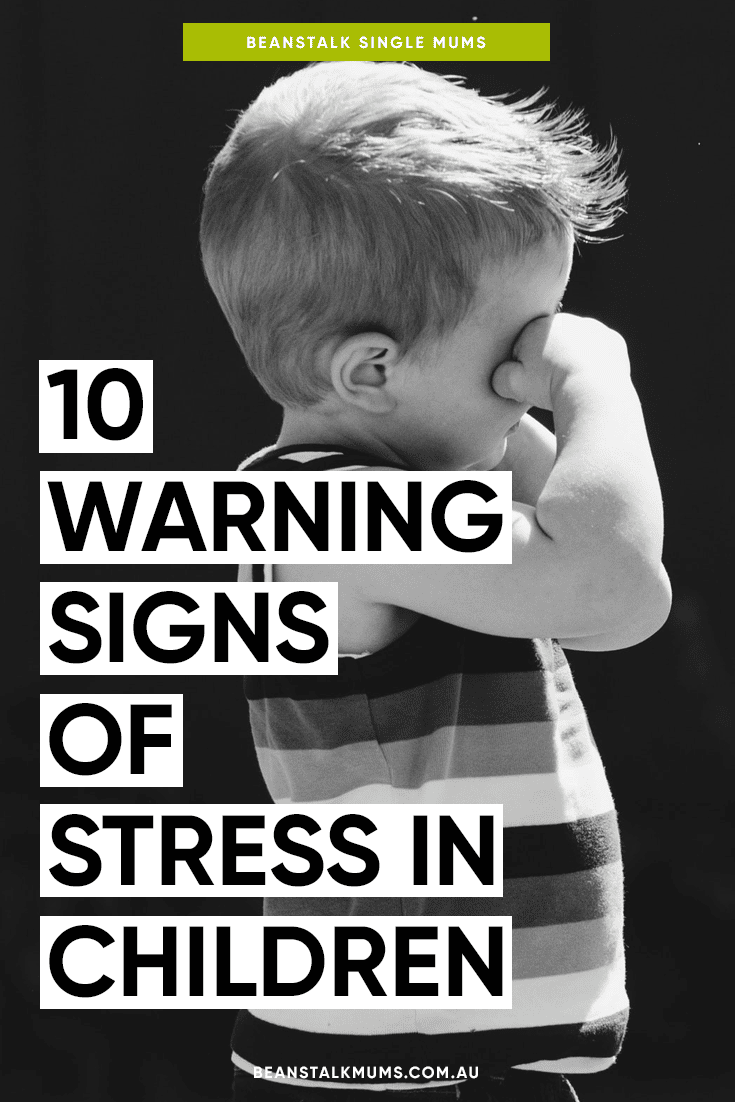
Stress is an unavoidable part of life. And while we are all so busy dealing with our own stress, we might miss the warning signs of stress in our children.
Interestingly, some stress is healthy and necessary for children because it helps them develop key emotional resilience tools. However, excess stress can lead to health problems and disrupt early brain development.
So how do we know if a child is stressed? What are the red flags we should look for? And, once recognised, what steps should we take to deal with them?
Here is a list of 10 warning signs of stress in children, with ideas to help them cope.
10 Warning signs of stress in children
1. Eating Habits
Significant changes in eating habits can also be a sign that your child is stressed. They may either revert to comfort eating to make themselves feel better or develop a lack of appetite in response to a deeply stressful situation. Making family meals stress-free can help your child redevelop healthy eating patterns and provide a great chance to talk about any issues that might be worrying them.
2. Trouble Sleeping
Stress can make it difficult to fall or stay asleep and can affect the quality of sleep your child gets, which in-turn, increases stress during the day. Changes in sleeping patterns, nightmares or your child not wanting to sleep in their own bed, are all signs that stress may be keeping them up at night.
To help improve their sleep enforce a peaceful bedtime routine that allows them to wind down slowly from the stresses of the day. Use peaceful music, a trusted nightlight and/or meditation to help them relax. There are a lots of app to help children suffering from anxiety and stress, try Smiling Mind or Headspace.

Stockist: Yellow Octopus
3. Mood Swings
We’re all a little moody at times, but severe mood swings can indicate signs of stress in children.
If you’re worried about excessive changes in your child’s mood consider starting a mood diary. Documenting the frequency, intensity, number and duration of mood swings throughout the week can be a great way to identify and manage ‘danger periods’. For example, if you find that mood swings are worst after school on Wednesdays you can try and identify possible causes and address it. Wednesday could be the day that your child plays with a different set of friends or has a certain lesson.
Once you know a danger time you can plan around it. Ensuring homework is done in a happy manner, no scheduled afternoon activities, and an easy dinner might be all that’s needed to break the mood cycle.
4. Acting Out
We all have emotional outbursts (parents included) but acting out aggressively is a possible indication your child is stressed. As a parent, staying calm during these meltdowns is the best (yet the hardest) thing you can do.
Giving your children tools and information on how to manage stress can make all the difference. Breathing, sipping water and lots of hugs are an example of simple tools they can use to build their emotional resistance. The great thing about these is that you can use them too.
CHILD STRESS SYMPTOMS (CONT.)
5. Aches and Pains
Little people have trouble linking emotional and physical responses. Sometimes, a simple recurring tummy ache can be masking a deeper issue. Headaches, vomiting and cramps can also be linked to emotional stress. By ensuring your child has a healthy diet you can rule out food intolerance and give your child a range of stress-busting nutrients. Nuts, salmon, spinach and oats are stress-busting food to get your child into the habit of eating.
6. Regressive Behaviour
Regressive behaviour can sometimes be caused by stress, significant transitions or traumatic events. Thumb sucking, bed-wetting and baby talk are some common regressive behaviours. However, any behaviour your child reverts back to after having grown out of is considered regressive. Gentle consistency, ensuring they have a good support system, focusing on positive behaviours and extra love can help your child get back on track.
7. Change In Behaviour
Looking out for significant changes in behaviour can help detect signs of stress in children. It is also a good way to develop awareness about your child’s emotional health.
For example, sudden excessive clinginess and crying in younger children can mean they are struggling with the stress of a recent transition or event. Responding with reassurance and consistency instead of frustration can help your child develop their resilience and leave them feeling safer and more secure.
8. Excessive Worrying
Worrying is a part of everyday life but when it begins to affect your child’s ability to function it could be due to excessive stress.
A simple trick to help your children get past worry sessions is to analyse and talk about the issue. Start by asking if there’s anything that can be done about it. If there isn’t, you can explain that worrying about it isn’t going to change the outcome. If there is something that can be done, try and work with them to identify what action can be taken.
Keep in mind that sometimes children worry so much it might be considered clinical anxiety. If your child worries so much it keeps him or her up at night or they are constantly or unnecessarily scared, consider sharing your concerns with your local GP.

Stockist: Booktopia
Warning signs of stress in children (cont.)
9. Being Withdrawn
Being withdrawn is another key warning sign that your child is stressed. No longer participating in activities that they used to enjoy, or pushing away family and friends are signs to watch out for. Bonding activities can alleviate feelings of withdrawal and encourage your children to open up. If you have the time, consider introducing mental health days once a month where you all skip on commitments and curl up on the couch for a movie marathon instead.
10. Trouble Concentrating
Overthinking is something that we can all relate to (hello, 2am worry session!), but it can be a sign of stress in children.
Concentration is a self-regulation skill which children begin to develop from a young age. When a child is stressed they may find it difficult to complete ordinary tasks, forget simple instructions, and no longer take an interest in schoolwork.
To help your child develop their concentration skills you can introduce some simple but effective games. Crosswords, Memory and Picture Puzzles are fantastic for improving attention ability whilst apps such as Lumosity have been shown to improve human cognition















